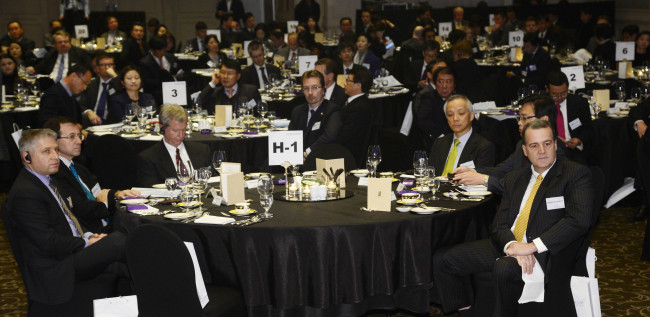
Participants listen to an address at the CEO Forum for Foreign-Invested Companies 2013 at a Seoul hotel on Thursday. (Park Hae-mook/The Korea Herald)
Under Korean immigration regulations, companies are allowed to employ a workforce with up to 20 percent of their employees being foreign semi-professionals or skilled laborers on an E-7 visa.
This regulation is one of the complaints from foreign companies doing business in Korea, and some foreign CEOs called for easing the rule when they attended a government-organized forum in Seoul last week.
“We sit at the same size because of the immigration law,” said a representative from a Canadian company with some 60 employees, speaking on condition of anonymity.
She was one of the 200 participants, mostly chief executives of foreign companies and foreign government officials, who attended the CEO Forum for Foreign-Invested Companies 2013.
The annual event was organized by the Ministry of Trade, Industry and Energy and the Korea Trade-Investment Promotion Agency. The event covered some of the general direction of regulatory policies, the regulatory reform system and the immigration law.
“If we are able to hire some expat professionals, then we will be able to hire more local nationals,” she said.
“We think that bringing highly talented human resources from overseas would be helpful to the local market also, and not necessarily take away from local employment.”
Some participants said such restriction adds to the financial pressure to many small and medium-sized foreign companies, as they have to hire more national workers in order to hire foreign employees.
Another chief executive from an English-speaking country insisted that certain businesses should be granted an exception or modification on the Korean-to-foreigner employment ratio.
“Our clientele is mostly foreigners; we are very different than many Korean companies,” he said.
The forum was organized to elevate foreign CEOs’ understanding of Korea’s regulatory policies and enhance their communication with the government.
Promotion of foreign investment is a top priority of the current Park Geun-hye administration, said Vice Industry Minister Kim Jae-hong, who delivered the opening address at the event.
“This year, we are expecting a record-high surplus of about 60 billion won ($56.8 million),” he said, noting that foreign investment has been a significant contributor to the country’s economic development.
Korea’s foreign direct investment peaked in 2012 at $16.3 billion, according to the ministry.
Jerome Pasquier, the French ambassador to Korea, praised the event for “explaining all the problems, deregulations and visa regulations.”
But criticism came from other CEOs of foreign companies, who wanted practical and timely advice. They complained that the event was close to a networking party, and not necessarily an informative session for the businessmen of the foreign companies.
“I think the event was superficial, treating all of us like firstcomers to Korea,” said the chief executive of a French company.
“This is a once-in-a-year event, and they should have briefed us on the issues and cases that took place this year,” she said, also complaining that content was too general and basic.
She suggested that introducing the most successful cases and how they did it would have been greatly appreciated.
“I was expecting to hear more about what we really needed to hear from the government,” said another foreign chief executive, adding that he had hoped for a panel discussion. “Everything seemed formal and simple; it felt like being in a party,” he added.
By Chung Joo-won (joowonc@heraldcorp.com)






![[Graphic News] More Koreans say they plan long-distance trips this year](http://res.heraldm.com/phpwas/restmb_idxmake.php?idx=645&simg=/content/image/2024/04/17/20240417050828_0.gif&u=)